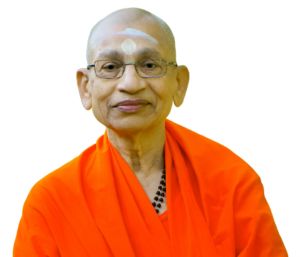
Spiritual Discourses: What we want is limitless
By Swami Viditatmananda Saraswati*
Na Me Bhaktaḥ Praṇaśyati – 03
Limited things cannot give limitless satisfaction! If Arjuna is a devotee of Lord Krishna, what does he want from Lord Krishna? An intelligent devotee would want freedom from all wants, freedom from all limitations. There are many devotees, but not many are discerning people. There are many stories in the Purāṇas of devotees who performed penance and, when the Lord appeared before them, they asked for some worldly thing: “Give me power so I can conquer the whole world.” “Grant me the boon that I will never die.” People consider such things to be success in life. But suppose you were the master of everything, so what?
They say that Rāvaṇa conquered the whole universe. After defeating everybody, when there was nobody left to fight with him, his arms were itching to fight. In spite of getting what he wanted, the rule of all the three worlds, he was still not satisfied. He was so powerful that great devatās, deities, were his servants. Gaṇapati herded Rāvaṇa’s cattle; Candramā carried his umbrella; and Varuṇa watered his garden. But despite all his power and success, he was still unhappy, not satisfied. That shows a tremendous lack within himself.
Prahlāda’s father, Hiraṇyakaśipu, was also like that. Nobody was as powerful as he was. But was he satisfied? No, for he could not control his young son, Prahlāda, who worshipped Mahāviṣṇu despite all his father’s efforts to stop him. Hiraṇyakaśipu, who controlled the whole universe, could not control the child. He sent his son to the gurukulam2 with instructions saying, “Teach this child that there is no God other than me.” But that child could not be converted. In fact, Prahlāda instructed his father that Viṣṇu was everywhere, even in the pillars of the palace. Hiraṇyakaśipu became so angry that he struck one of the pillars. Out from it came Viṣṇu in the form of the man-lion, Narasiṁha, who killed Hiraṇyakaśipu.
These stories show that the human heart cannot be satisfied by achieving any amount of worldly or otherworldly power, wealth, and prosperity. Why? Because however great the achievement is, it is still incomplete. What we want is limitless. Nothing limited can satisfy us. Nothing incomplete can satisfy us. We want completeness, wholeness, and fullness. Anybody who asks for anything limited is always going in circles, trying to satisfy one desire after the other.
Therefore, an intelligent bhakta, devotee, is one who wants real success in life, one who wants to be free from all senses of want and lack. Who can give him that? Īśvara.
We search for the limitless where it is not
When Lord Krishna uses the pronoun I, he means the limitless, the whole. It can also be called īśvara, God, reality, satyam, the truth. Everybody is searching for the truth. That is called God.
Scientists are also looking for the truth, but they are searching for it in matter, which is the wrong place. Scientists are very smart people, but not rightly intelligent because they are looking in the wrong place. Where is God? He is where the scientist has not looked. If you look for something where it is not, how can you find it?
Take the example of the wealthy businessman from Chennai and the famous thief from Delhi, who travelled for two nights from Chennai to Delhi in the same first-class train compartment. During the first day, the businessman counted his bundles of cash behind the lid of his briefcase, shielding the money from the sight of the thief. That night, the thief crept down from the upper berth and searched the briefcase for the cash, but he could not find it. Then he searched the businessman’s suitcase, but again he found no cash. Disappointed, he returned to his berth and slept for the rest of the night.
The next morning, the businessman again opened his briefcase and again counted his money behind the lid. The thief became even more determined to find the money and resolved to search everywhere the second night. That night, when he heard snoring in the lower berth, the thief quietly descended. He checked the briefcase, but the money was not there. He checked the suitcase; it was not there. Then he quietly searched the person and under the bedsheet but could not find the money anywhere. Disappointed again, he went to his berth and the night passed.
The next morning, with the train approaching the destination, the businessman again mischievously opened his briefcase and started counting his money. The thief, in his frustration, addressed this businessman, “Sir, I am a famous thief from Delhi and I am travelling with you for the express purpose of stealing your money. You are my guru. I no longer want your money. Please tell me, where were you hiding it?” The businessman replied, “Every evening when you went to the restroom to prepare for sleep, I hid it under your pillow.”
As long as the thief looks where the money is not, he can never find it. Similarly, the whole world is in search of God, and they are frustrated that they cannot find him. In fact, scientists dismiss him, saying, “There is no God. Where is God? If there is a God, show me; produce him before me.” The scientist looks everywhere but does not look where God can be found, in himself.
You are the limitless
All of us are searching for God. Whatever we want to achieve, ultimately our goal is to see God in that form. If I want to be a millionaire, I am searching for God in the form of money. If I’m seeking political office, I am searching for God as power. We are searching everywhere except one place, our own self. That is where the truth of the whole universe lies. The satyam, truth or reality of the whole universe, is you.
It’s hard to believe. “How can it be me, Swamiji? I am satyam? I am the reality? I am the truth? I am limitless?” Yes, that is what the Upaniṣads say. “But how am I limitless? I do not feel limitless for even a moment. I am constantly suffering from a sense of limitation. How do you say that I am happiness?”
This is a big problem in our lives. Like that thief who is searching for money everywhere, we are also searching for God everywhere except where he really is. We’re searching in money, name, fame, power, recognition, heaven, paradise, everywhere except where he really is. Like the thief who would never suspect that the money is under his own pillow, I can never suspect that God could be myself. I cannot suspect that what I am searching for is myself. I can never suspect that I am limitless. Why can I not suspect that I am God? Because I have taken for granted that I am not God. I am ready to worship anybody else as God. You can come in any kind of strange attire or hairstyle, and I might worship you as God. But I assume that I cannot be that limitless, complete being.
Īśvara’s devotee attains the limitless
We are all born with only one purpose in mind, with just one agenda. Whatever we pursue, we are seeking success. Vedanta says that the only way you can feel successful is when you fulfill your one agenda, and that is to become free of every kind of desire, every kind of lack or want. When you discover that wholeness and completeness, you have found what we call God. The purpose of bhakti, devotion, is for the sake of fulfilling this one goal, this one purpose we have in life.
The ultimate definition of God is limitless, whole and complete. How many limitless things can there be? Only one, nondual. Whole, complete, limitless, nondual—that is the Vedantic description of God. When Lord Krishna says I, he means God, īśvara, who is one, nondual, limitless. That is the Vedantic teaching about God.
Who is the real bhakta, devotee? The real bhakta is the one who understands what it is that he is really seeking. We are all bhaktas of what we consider as our goal. But the discerning bhakta, the intelligent devotee, is the one who knows that God, limitlessness, is what he is ultimately seeking through all pursuits. In that goal, he doesn’t get ruined.
Na me bhaktaḥ praṇaśyati, my devotee does not get ruined. What does it mean that he does not get ruined? It means he never falls from his path. He never suffers a decline. He ultimately reaches me, meaning that he attains his goal. Lord Krishna says, “na me bhaktaḥ praṇaśyati, my devotee will attain his goal.” What is the goal? It is to be free, to be complete, to be limitless, to be happy, to be completely satisfied. A bhakta or devotee attains that goal. That is how this statement should be interpreted.
…to continue
*Swami Viditatmananda Saraswati has been teaching Vedānta Prasthānatrayī and Prakaraṇagranthas for the last 40 years in Ahmedabad, Gujarat. Throughout the year, he conducts daily Vedānta discourses, accompanied by retreats, and Jñāna Yajñas on Vedānta in different cities in India and foreign countries.







Wonderful article. Very-very though provoking. Very helpful for all those who are seeking spirituality.
Very informative and excellent discourse explained effectively 🙏🙏🙏